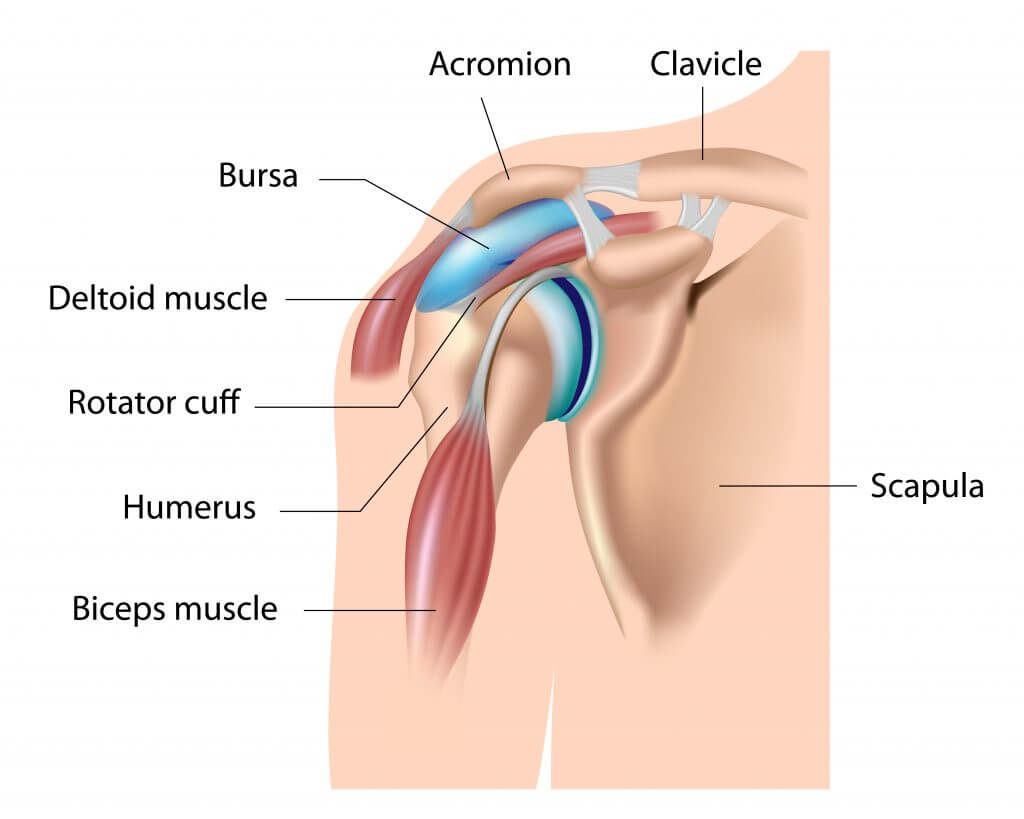
The shoulder is one of the most complex joints in the body. Without it, life just wouldn’t be the same. So when something goes wrong, the effects can be far-reaching, not to mention painful. Here’s a breakdown of everything you need to know after being diagnosed with shoulder bursitis, some exercises to stave off the pain, and recommended treatment options.
What Is Shoulder Bursitis?

The bursa is a fluid filled sac that lies within each of our shoulders. Its job is to help us move our arms and is responsible for upper body mobility. By reducing friction between joints, it acts as a cushion to the many moving parts that make up the shoulder joint. Injury or inflammation of the bursa results in shoulder bursitis – a painful condition that can present alongside several other conditions, such as rheumatoid arthritis.
What Does Shoulder Bursitis Feel Like?

Shoulder Bursitis (also known as Subacromial Bursitis) can feel slightly different depending on the kind of injury or underlying cause. Often shoulder bursitis presents with tenderness within the shoulder, along with pain, and can even make you feel slightly unwell and feverish. It can also result in a loss of muscle strength, a frozen shoulder, or shoulder impingement.
If you are experiencing any of the above or below symptoms, you should see a qualified physiotherapist to get to the root of the problem.
Early Signs And Symptoms
Knowing the warning signs and symptoms can be helpful especially if you catch them early and get treatment. Bursitis can affect the tendons of the rotator cuff, causing some movements to be particularly painful. While this is often due to a specific injury, here are some more telltale signs to watch out for:
- Pain and discomfort around the top of the shoulder
- Warmth and aching around the site of the shoulder injury
- Tenderness and swelling around the shoulder
- Pain when you’re trying to put a shirt on or lift your arms up
- Difficulty reaching out and pushing things
Shoulder Bursitis Exercises

Catching symptoms early and getting the right treatments in place can drastically change the outcome. One of the best ways to achieve reduced pain and inflammation in the shoulder is through targeted shoulder bursitis exercises.
Here are some to get you started.
1. Posterior Shoulder Stretch

You’ve probably done this common stretch before. It’s a great one to do at home or in the office because it doesn’t matter whether you’re sitting or standing.
- Hold the elbow of the same arm that is experiencing symptoms
- Place your hand on your opposite shoulder
- Gently pull your elbow across your body – allowing your shoulder to stretch for around 15 seconds
2. Shoulder Lift

This is a great exercise to release tension and is easy to perform.
- Stand straight and breathe in, lifting both shoulders up as if you were shrugging
- Hold and release back down with the out-breath
- Repeat 5 times
3. Shoulder Rotation Stretch

This is a slightly more advanced and intensive exercise that can work wonders if done appropriately. This exercise targets the internal shoulder – which is exactly the area affected by shoulder bursitis. You’ll need a regular-sized bath towel for this one; simply twist it up and hold each end with your hands.
- With your affected arm at the bottom, hold the other end of the towel near your head
- Slowly raise your upper arm as high as it can go and hold for 6 seconds
- Pull down with your lower arm to the start position
- Repeat 5 times
4. Shoulder Flexion Stretch

For this exercise, grab a broomstick, rod, or non-weighted bar. This shoulder bursitis exercise is especially for anyone who has trouble raising their arms over their head.
- Hold the broomstick or bar with both hands, equidistant apart
- Keeping straight posture and both legs firmly on the ground, slowly raise your hands at the same time
- Once the bar is directly over your head hold for 3 seconds and then slowly lower it back down
- Repeat 10-20 times
5. Shoulder Blade Compress

This exercise can be done anytime, anywhere and helps a lot with realigning your back and relaxing your shoulder muscles.
- Standing or sitting, make sure your arms are relaxed and to your side.
- Gently pull your shoulder blades together at the back and push out your chest at the same time
- Hold for 5 seconds, releasing your breath as you let your shoulders fall back into their initial position
- Repeat 5-7 times
Can I Exercise With Shoulder Bursitis?
Generally, it is not a good idea to exercise if you are expecting symptoms of shoulder bursitis. The inflammation and pain are likely to get worse with strenuous exercise and repetitive movement. However, once you’re on the road to recovery, certain exercises, including shoulder bursitis stretches provided by your shoulder physio will help bring back your mobility and reduce shoulder pain.
Is Heat Good For Shoulder Bursitis?
No. Heat is not good for shoulder bursitis because it can increase inflammation. Gently applying ice packs to the affected shoulder every hour or so will help reduce inflammation and reduce pain.
Exercises Aren’t Working? Contact A Qualified Shoulder Physio Today

If you notice symptoms persisting, it might be time to consider shoulder bursitis treatment options from a qualified physiotherapist. At Integrity Physio Como, we aim to have you back up and running with a solid plan for recovery using tried and tested physiotherapy techniques. Get in touch with our team today and arrange a consultation.




